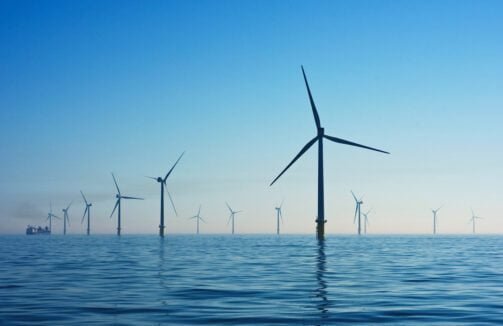Seagreen, off the Angus coast, can generate enough electricity to power two-thirds of Scotland’s households.
But operator SSE says the consenting time needs to be halved if there are to be enough turbines to meet the government’s climate change targets.
The company says Seagreen will displace more than two million tonnes of CO2 each year, helping reduce the UK’s reliance on fossil fuels for generating electricity.
The array sits about 17 miles from the coast and in 58 metres of water, making it the deepest fixed wind farm in the world.
Those in deeper waters, like the Hywind project off Peterhead, are engineered using floating turbines.
Originally planned with 150 turbines, the number was reduced because larger generators made it possible to harvest the same amount of electricity with fewer structures.
The company is now exploring the feasibility of another phase of development by adding a further 36 turbines.
The first power was generated in August 2022 but it has taken another year for it to be fully completed.
About 700 long-term jobs will be supported by Seagreen, half of which are based in Scotland.
Around 60 full-time positions in operation and maintenance are to be based at the service facility in Montrose port.
Emissions targets
Seagreen is a joint venture between TotalEnergies and SSE Renewables.
SSE Renewables’ director of offshore wind, Paul Cooley, told BBC Scotland News that decisions taken now will determine whether 2030 targets for cutting greenhouse gas emissions will be met by the Scottish and UK governments.
He said: “I think if we don’t speed things up we’ll just not hit the targets.
“That’s the reality so there’s a real imperative now to move much faster in terms of hurdles like grids, like consents and like pricing in the supply chain.”
The UK’s offshore wind capacity is growing rapidly.
Just last week, the first electricity was generated from SSE’s 277 turbine Dogger Bank project off the coast of East Yorkshire.
Final construction is also under way on the Neart na Gaoith (NnG) wind farm off Fife which has faced a legal challenge by RSPB Scotland because of concerns over migratory birds.
Claire Mack from the industry body Scottish Renewables said there was a huge pipeline of projects in Scotland thanks to an abundance of wind.
“We’ve got over 20 offshore wind projects leased within Scotland which is one of the largest commercial leasing sites that we have across the world.”









